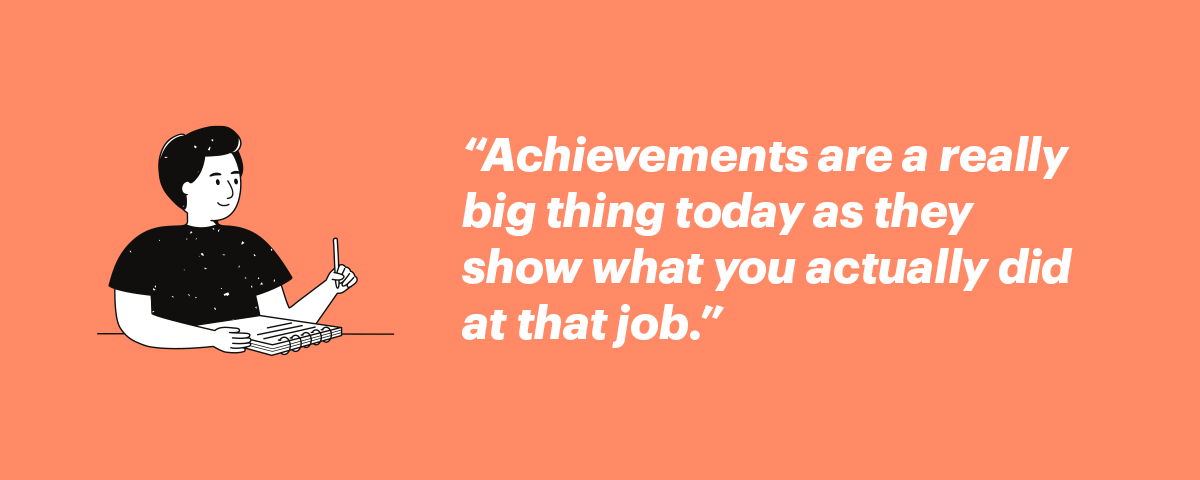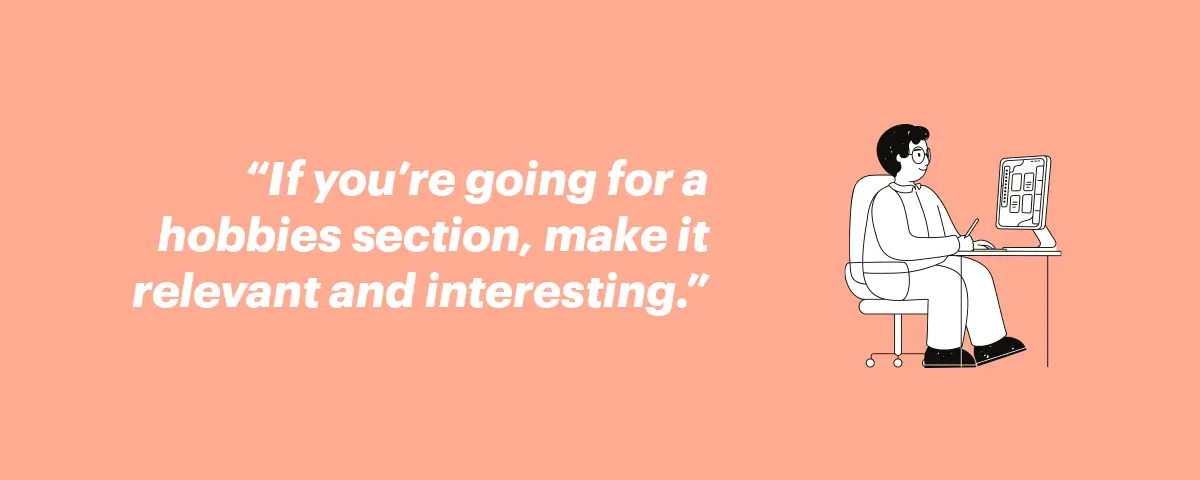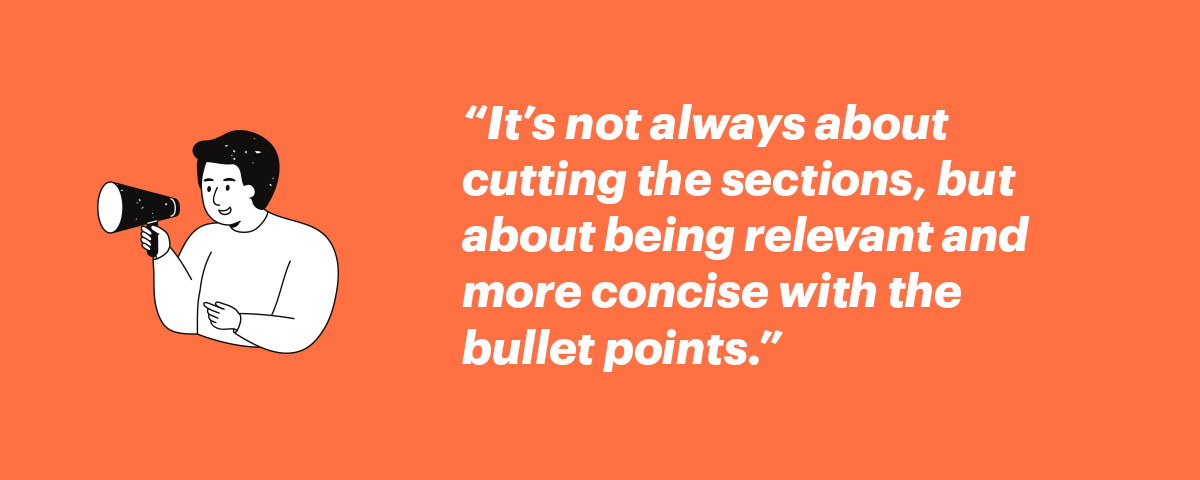Imagine you could get solid job search advice directly from someone with experience in recruiting and HR. Wouldn't that be helpful? Now you can do just that thanks to our new interview series Recruiter Reveals! Every month I interview our resident HR expert Christy Morgan on various job search topics — be it resumes, cover letters, job interviews, or anything marginally career related. |
Welcome to the second episode of our new interview series Recruiter Reveals with Christy, our resident HR expert!
This time, we talk about resumes — the inevitable part of your job search.
We'll review some of the most common design and content mistakes as well as answer every job seeker's question — what should an ideal resume look like?
Let's talk about how you can come up with a perfect resume that will help you get that job!
In this interview, you'll find out:
- What are the most common design mistakes;
- What are the most common content mistakes;
- What does an ideal resume look like;
- Which sections are a must and which not;
- Whether you should write it in 1st or 3rd person;
- How to make your resume stand out;
- What's the best way to submit a resume;
- Is using a resume writing service worth it?
Throughout your career, you've seen plenty of resumes. What do you think are the most common resume design mistakes job seekers make? What should they avoid?
First of all, many job seekers are trying to cram all the white space which makes their resume hard to read. Or on the other hand, trying to spread it out or using large font sizes so it looks like they have more experience.
Another issue is margins. Sometimes, people try to get everything on one page or two pages and they use very narrow margins. Firstly, it doesn't look good and secondly, if someone is printing it off and they lose the margins, it doesn't give a good impression.
My advice regarding resume design is pay attention to margins, don't get too scared of white space and use it effectively, and don't make it look like a wall of text. Ideally keep your resume a maximum of two pages, use a standard and clean font, nothing too big or too small, something between 10 or 12 points is ok (11 is generally best).
Also avoid text boxes because ATS systems can't read them. If you're going to use columns, make sure they're not side by side. That's when it can be read incorrectly by the ATS. If you're going for a design resume, make sure that the design is appropriate, attractive and looks professional.
What about visuals on a resume? To use or not to use them? For instance, graphs, icons, bullet points...
Bullet points yes because that can be read correctly and it also helps to guide the reader's eye through your resume, whether it's going through the ATS or read manually. There's also no harm in adding little graphic elements like icons. They won't be read by the ATS but from manual reading, you can see that. Just make sure they look professional and the emphasis is on the content.
As for the graphs, they can't really be read by the ATS. Also, the majority of graphs I see on resumes aren't relevant. For instance, saying you have proactiveness 75% — unless it's a 100% or very close to it, it kind of leaves a negative impression. It's also really subjective. What's your 100% can be your previous employer's 60%. So, I usually say in general, leave off graphs. Unless you're in a field where you need to provide some statistics.
I also advise not putting information just in graphic form. For instance, many people put hobbies in icons instead of writing them down. ATS can't read that. So, always use text, even with icons.
Then what about the content? What do you think are the most common resume content mistakes?
First of all, not including the right content, or more specifically, not focusing on relevant content. In the old days you'd include every job you ever had, way back to that paper delivery job in your early teens. Now, we generally just focus on the last 5-10 years. Also, people put in the job descriptions things that aren't relevant to the job they're applying for. For instance, if you're applying for an accounting job, having a job description for a secretary position is not very relevant and it takes up space.
Then not including a good balance between responsibilities and achievements. Achievements are a really big thing today as they show what you actually did at that job. Some people feel modest about doing that but that's what recruiters are looking for as well. Ideally, these should be measurable - percentage, dollars, whatever you can quantify. It has a much higher impact.
Sometimes, people also get too creative with the headings and it may be a disaster because ATS systems look for specific keywords like education, work history, and so on. For instance, I've seen someone replace a Professional summary headline with the word “Snapshot”. It sounds great! But the ATS doesn't know what that means, therefore it doesn't know how to categorize it.
What about grammatical mistakes?
You do get that a lot, even with copywriters! Sometimes, you just focus so much on not making a mistake that you make it. It especially seems unprofessional if you're doing communication, language, or education. So, I advise to pay attention to that for sure. Even get someone else to proofread it with fresh eyes if you need to.
That's funny because the no.1 thing that's always highlighted when it comes to resumes is that you should always proofread it.
Yes, exactly. In fact, you can just click and the computer will do the spell check for you. However, these are not always that reliable. Ideally, get someone else to double-check it.
What about buzzwords? Are recruiters really that allergic to some cliché phrases?
Oh yes, because you see it constantly! :D Things like “I'm detail oriented”, “professional”, “passionate”,... There are loads of them. Everyone uses it, so no one pays attention to it. It's kind of a waste of space. It's also very subjective. Just stick to the facts. Rather say you're a senior account manager with 15 years experience vs saying that you're a dedicated and detail oriented account manager.

So, there's no point in using such words because recruiters will ignore them anyway?
Yes, exactly. Although, there's this trend of putting some focus on soft skills again. But still, hard skills are the most important thing in resumes. I'd say, keep soft skills off your resume and put them in your cover letter. Cover letters are more personal and persuasive, so they’re better suited for explaining your motivations and relevant soft skills.
Out of all of these mistakes that you've mentioned, which one would make you reject a candidate?
None. I'd always try to be as unbiased as possible and look at the actual content. I might be a bit put off by things like “I'm the most fabulous manager that ever existed” or something like that. But then again, you look at the evidence and what they actually have in their resume. If they're in the communication field, for example, then I’d definitely look at it with a much less forgiving eye, because it's a reflection of their skills. But otherwise, I wouldn't.
That's interesting, because about 70% of employers say that even minor details like unprofessional email addresses are enough to reject a candidate before they even finish reading the resume. What's your take on this?
Email addresses can be tricky. For example, there are recruiters who might think you're old-fashioned because you have a Hotmail account. I can forgive you for that, though. On the other hand, I have seen some pretty questionable addresses over the years! There are people out there who have addresses like johnnysexy@gmail.com. Good to know, John! :D
It's definitely not professional, but I wouldn't reject them on such a basis. Oh, and don't ever use your work email address. I know an IT person who used to check colleagues’ emails that came in with subject lines like “Reply to Your Application” or “Interview Invitation”. So, use your personal email. Please … a professional-sounding one!
Let’s talk a bit about ideal resume composition. How to compose resumes of students and fresh graduates?
This is a very general question so I can only give a very general answer. The best resume composition for students/fresh graduates is a one page resume, neatly formatted and when it comes to sections, putting education first, then work experience, key skills, volunteer experience and other voluntary sections.
What about a resume summary? Should students/fresh graduates use them?
If they mention any relevant experience, it's fine. Something like “I'm a recent biology & marine engineering graduate with 2 years of internship field experience”. But I advise to avoid having a bland objective statement like “I'm looking for a job in marine biology”. We know that, so it's redundant. Be a bit more detailed about who you are.
Let's say I'm a marine biology student with volunteer experience. Should I present it as regular work experience, or rather include it in a separate section?
Yes you can, if it's directly relevant to your field. For instance, if you want to be a marine biologist and you volunteered at SeaWorld, you can incorporate that into professional experience and just put (Volunteer) after the job title. But if you have more extensive work experience, volunteering can go into a separate section.
What about the resume composition for more experienced professionals?
They usually have two pages resumes, but it's okay if it's longer as long as there's a specific reason behind it, e.g. you're an educator or a project manager. When it comes to content, start with a professional summary followed by your key professional skills, career history, education, certifications, relevant technical skills, language skills, volunteering, and other optional sections such as professional memberships.
Putting key professional skills before work history? Why?
Because the recruiter will see straight away that you're a potential fit, whether they’re looking at your resume via an ATS or manually. It also makes it much easier to tailor your resume to specific jobs. You just go and look at the keywords in the job description and go back and quickly tweak your key skills at the top (as long as they’re actually relevant to your experience, of course!) If recruiters can first see who you are (in the summary), then what your key skills are, and after that what your most recent job is etc., it's much easier for them.

When it comes to Work Experience sections, many resources say you should only highlight achievements and omit duties. What's your take on this?
I usually say have both. I recommend putting a few most important duties first because that's adding the context, and then the achievements. You can maybe get away just with the achievements if you're in an achievement-focused role, for instance sales. But in general, I'd recommend having a mix — context plus impact.
What about sections like Key Achievements? Is it better to highlight achievements in the work experience section or to devote a separate section to them?
Sometimes, having a Key Achievements section above Work History is OK, because it helps recruiters to see immediately what your accomplishments are if they are significant. Otherwise, I'd say incorporate achievements in the work descriptions. That's where they’re the most relevant and where the context of your achievements is, so it makes more sense to the reader. But you can also mention anything particularly awesome in your summary. Something like “Award-winning sales person” will immediately catch the attention of recruiters. Then you can mention the specific award/s in the job descriptions.
Which resume sections are a must in your opinion?
These days, I'd say a Professional Summary and Key Skills are a must. Then Work Experience, Education. And, of course, include contact details at the top of your resume, that goes without saying. Other sections are optional depending on your job/industry and level of experience.
Out of the optional sections, which ones are in your opinion completely worthless? For instance, references, hobbies, and so on?
Don’t include references. Hobbies are debatable. If you're going for a Hobbies section, make it relevant and interesting. We can again use the example of marine biology. A relevant hobby would be scuba diving. That's relevant, interesting, and also a good conversation starter at interview.
But there are people who put hobbies like reading, listening to music, and other stuff which is not different in any way. So, you can include hobbies, but make it interesting — calligraphy, sky dividing, I walked the camino in Spain, I make the world's best brownies, and so on.
What about other sections like Publications, Social Media, Awards..?
Publications are relevant for people working in academia. But in a regular resume it's not a section you'd ever need . If you have a portfolio, for example if you're an IT professional, you can mention the link in the contact section.
As for a Social media section, I'd normally include LinkedIn only. If you're on social media or in a creative field and have your portfolio, I'd be probably more inclined to use that in the contact details section — recruiters can check it immediately without having to flip through the sections. In general, if social media is personal, don't put it on your resume.
Awards — the same thing as for Achievements. If you have extensive experience or you've done something really impressive, highlight that immediately. But if you've been an employee of the month twice, that's something I'd include in the job description.
And what do you think about custom resume sections? For instance, if an IT person has a section Custom Projects, or a writer adds a section Media I have written for? Is that OK?
Yes, that's absolutely OK. Alternatively, if you want to save some space, you can add a link to your portfolio in your contact details section.
Let's now imagine a situation which is pretty common — a job seeker wants to cut his resume down to one or two pages. Where should they begin?
Achievements can be added into the job descriptions, you don't need a separate section. Languages may be important to include, however, you can save some space and mention these in your summary. Technology skills — if they're relevant include them, if not, you can leave that off. You can also leave off References, Hobbies, Social Media, or Strengths sections.
However, it's not always about cutting the sections, but about being relevant and concise with the bullet points. Cut out the fluff and get straight to the point. You don't need to write absolutely everything you did in your job. Focus on the relevant stuff only.
When talking about resume writing, should job seekers write their resume in 1st or 3rd person? What do you think?
Good question! With two answers. :D I recommend writing a professional summary in 1st person because it's kind of personal, you're introducing who you are. But write the rest of your resume in 3rd person because that's more objective. Plus, you're trying to be concise and we know it's about you anyway. You can also get away with 1st person in the hobbies section, for example “I'm a fabulous brownie baker! I raised $1,500 in a charity baking competition in 2019.”.
Alright. So, I wrote my resume, it went through the ATS and you are reading it as a recruiter. What's the first thing you notice?
Good things — whether it looks well formatted and easy for me to read, and whether it's relevant. That encourages me to read on.
Negatively, the same thing — bad formatting, walls of texts are very off putting, and again, when it's not relevant to the job they're applying for.

So, if I want to make a great first impression, it's really important to have a clean, nice resume design, use bullet points and highlight relevant keywords and skills.
Yes! By doing this, you're making the recruiter's life easier. It will be almost a pleasure to read your resume because there's nothing that will take up too much time or confuse me.
Alright, but then I'm thinking — these tips are quite general and in the end, all resumes may look alike. So how do I make my resume stand out?
Well, it depends. In the ATS system they'll all look alike because it typically reformats them in the same way. But when you know it's going to be manually reviewed, feel free to use a design template because it makes you stand out and looks nice. And simply make sure it looks clean, nice and easy to read. I know it maybe doesn't sound that exciting, but if you're reading resumes every day, these things really do please you.
Is there any way to stand out if I'm sending a resume to a company which uses ATS?
Make sure it's as close a fit to the role as possible. Pay attention to keywords and the experience/skills to back these up. Design elements are generally stripped, so hoping you’ll stand out on that basis without the appropriate content to back it up just won’t work. Relevant content in an ATS-friendly format will make you stand out compared to unsuitable or unreadable applications.
What's the best way to submit a resume then? Via job boards, email, LinkedIn?
These are all valid ways to submit a resume and it really depends. Often, companies advertise the job via various channels and it's all going to the same ATS. The same for email - it's generally forwarded straight to the ATS, but in this case you run the risk of not reaching the right person or being forwarded if you don’t do your research and find out the right email address.
Sometimes, LinkedIn has the advantage if the company offers ‘Quick Apply’, which means you don't have to go through filling in the forms - a huge pain for many job seekers. However, the key is to follow the instructions. If they ask you to apply via job board, then you should for sure apply there.
Or if you know someone at the company, you can approach the person directly.
Exactly. It's still possible that it will have to go through the ATS anyway but at least you have that advantage of knowing somebody and they may recommend you.
What about the old school way of submitting the resume in person? Are people still doing this?
Yeah, some people still do that. It's funny but there's no harm in it. If you're a junior or if it's a smaller company, you can take it there personally, if you get past the security. :D Small companies might even appreciate that. They're probably not using any ATS, HR might not even exist, so there's no harm in it.
But I'd still recommend to send it also via email, just in case. Then it's not going to get lost, which is a risk if you have a paper copy of something. I shamefully remember when I was just starting out my career as an administrator at the recruitment company and sometimes, resumes didn’t get where they should because there were so many of them. We had paper everywhere! Or we'd put them aside to give to the right person next time we saw them, and for whatever reason it got forgotten. Such things happen. So, be aware of this.
Lastly, what do you think about today’s really popular thing — job seekers paying other people to have their resumes written?
Good question. It's also something that I do, as it's a part of my profession. As objectively as possible, I think there's nothing wrong about it. Because at the end of the day, you shouldn’t be hired because of how you wrote your resume, but because of your skills and experience. So, I don't see it as a bad thing and it can actually be a smart move if wordsmithing isn’t your thing.
Key takeaways — What should a resume look like?
- Resume design: Pay attention to margins, have enough white space and use it effectively. Use a standard font, nothing too big or too small, something between 10 or 12 points. Avoid text boxes or columns because ATS generally can't read them.
- Resume content: Avoid full paragraphs, use bullet points. Write your summary in 1st person, the rest of the resume in 3rd person. Be relevant and concise. Use numbers.
- Student/ fresh graduate resumes: Keep your resume to one page. Use a professional summary if you have relevant experience, followed by education, work history, voluntary experience, key skills, and then any optional sections.
- Experienced professional resumes: Keep your resume maximum to two pages (ideally). Start with a professional summary followed by your key professional skills, career history, education, certifications, relevant technical skills, language skills, volunteering, and then optional sections.
- Optimizing resumes for ATS: Have standard headings, include relevant keywords from the job description, use standard fonts, avoid graphics (particularly if text can’t be ‘read’), columns, or text boxes.
- Submitting a resume: Follow the instructions. If there are none, apply via LinkedIn or email if you want to skip filling out forms. If it's a smaller company, you can also hand them your resume personally.
Got the recruiter's insights on what an ideal resume looks like? Now let's put those insights into action. Shape your own perfect resume using our AI-powered resume builder. It's your ticket to creating a resume that meets recruiter expectations.




